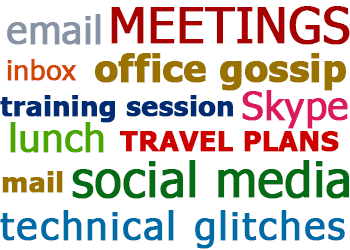It is perfectly normal to be nervous about starting a new job. In fact, Forbes ranks starting a new position as one of life’s most stressful experiences; the interview process is often long, emotions run high, and there is all the pressure that comes with wanting to do well. But don’t worry: an outstanding track record is what landed the job in the first place. Combine that with these 15 suggestions for the first 100 days at the new job, and we guarantee better odds of success.
1. Act like the interview is not over.
Getting the job does not equal tenure. Amanda Augustine, a TopResume career advice expert, says “the first three months of any new job are an extension of the interview process. From the first day, you need to be on your game.”
2. Show up ready to play.
Showing up on time, sharp, and well rested goes a long way in creating a good first impression. Pick out clothes for the week, practice the morning commute in advance, and go to bed early the night before. Eat a balanced breakfast and bring coffee for the first few days to eliminate the stress of a grumbling stomach or a problematic office coffee maker. Coming thoroughly prepared to work will calm new-job nerves. Walk into the office on time with a plan for the day instead of stressing while rushing to work.
3. Limit distractions.
Keep smartphones out of reach and silenced, and block Facebook and social media sites to reduce the temptation to sneak a few minutes. Limit personal phone calls, texting, and other personal-time activities (especially in customer-facing roles).
Block out time for low-return work activities like checking email; it can easily suck up time that could instead be allocated to more productive work.
4. Don’t ask the CEO for a pen.
As much as possible, solve problems without asking for help. Save small questions (like the location of office supplies) for coworker small talk, and keep communication with management focused on work. Know exactly what accomplishments they want to see, and get them done.
5. Defend valuable time.
If the hiring manager has not provided the company’s normal work hours, ask a few days in advance. On day one, arriving 10 to 15 minutes early is a safe bet. Any earlier and it may not be possible to get into the building, or may involve an awkward wait if the manager has not arrived yet. After the first day, it is good form to arrive early and to stay late, within reason.
The manager may indicate that it is okay to leave; if so, do not argue—it is okay to go. Be productive while at work. New employees who put in extra hours with nothing to show for it will not improve their reputations. Demonstrate that good results are a top priority.
6. Learn names.
When people meet celebrities on the street, they usually have no problem remembering their names. Why? Because that person was important enough to remember. It may sound harsh, but forgetting someone’s name sends the message: “You weren’t important enough to remember.” Saying “I’m just bad with names,” makes people think, “I’m not important to you.”
That may seem overly negative, but the inverse—remembering people’s names—has tremendous positive benefits. It makes people feel special, it will make you smile, and it is beneficial in the long run. Remembering names is one of the little things that goes the longest way.
For most people, asking a person’s name several times the first time they meet is enough to remember it. But they feel embarrassed doing so, and avoid asking. Get over it. If that does not work, try something else—mnemonic devices and alliterative devices are popular—but whatever it takes remember the names of the people you see each day.
7. Take advantage of all the training.
As much as possible brush up on the necessary job skills to reduce the time needed to get up to speed. Take detailed notes and listen carefully to training that the company provides. Do not assume that the training will cover everything. Remember to thank the person who provided the training.
If the company does not offer much training, ask questions to fill in the gaps. It is better to ask a question than to do a task wrong. Accept offers from coworkers to demonstrate how things are done (as long as it does not compete with work assignments). It is a great way to build trust with the team, and they usually have tips that the official training does not cover.
8. Keep work areas clean and secure.
Information security is a top concern of employers, and no one wants to be responsible for a security breach during the first month on the job. So be smart! Devices, computers, and paper files containing secure information should be locked or filed away when not in use. Keep a private record of passwords in a secure place (such as in a locked desk drawer or a password-protected file) to avoid asking for them more than once. In a high-security job where passwords may not be written down for any reason, make it a top priority to memorize them, using mnemonics if necessary.
9. Fight to stay organized!
With so many new stimuli and unfamiliar processes, critical details are more likely to slip through the cracks. So write everything down! Creating one consolidated task list for the day (preferably on the computer rather than a scrap of paper) and checking it often is a great way to stay on track.
Take notes immediately when given a task. Do not rely on email as a way to store important information. Around 3 p.m. revisit the list. Pick the most important tasks to finish before the end of the day and move the rest into a to-do list for the next day in order of priority.
10. Respect the rules.
Little rules are a big deal in most offices, and often a bigger deal than they seem. But they also provide an opportunity for conversation and team-building. Ask where the coffee machine is, or where the best lunch spots are, and listen to what they say. Friendly small talk is the only way to get past the awkward new stage, and it is the best way to learn names and faces quickly.
11. Avoid taking time off.

Disclose unchangeable vacation plans as soon as possible (ideally during the interview process) to circumvent inconvenient surprises for a new employer.
Know the company policy for vacation thoroughly before planning anything. Come prepared with a plan to stay up to date on job responsibilities if it is necessary to take a day off.
Although illness is unavoidable, it is good form to show up and work cheerfully through minor colds. Similarly, make an effort to show up during adverse weather conditions, unless the manager says otherwise.
.
12. Handle mistakes promptly and gracefully.
Mistakes happen, and no one likes to make them. Acknowledge the problem, take ownership of the situation, communicate a plan to fix it, and follow through without delay. Do not argue. If the manager suggests a different way to correct the situation, do it. Be responsive on emails, and error on the side of over-communicating to avoid future mistakes and miscommunications.
13. Never refuse a challenge.
Managers commonly ask new employees to handle work outside the advertised job content. View this as an opportunity to demonstrate a strong work ethic and possibly learn a new skill. Do not dismiss tasks that are outside the job description. Be the first to adapt when obstacles arise.
14. Stay in touch with trusted colleagues.
Cutting off old colleagues at the start a new job will stifle the natural growth and maturity of a professional network. After a month or so at the new job, it is appropriate to reconnect with old colleagues. Update LinkedIn with the new job title, and connect to new colleagues. It will help with learning names and titles, and it may provide insights into the skills and accomplishments they consider most important. Start slow—no need to send out 200 connection requests on day one.
15. Smile!
Still nervous? Smile! Smiling is a scientifically proven relaxation technique. Even a forced smile boosts real confidence.

For more advice on starting a new job, contact us at info@bluesignal.com.

